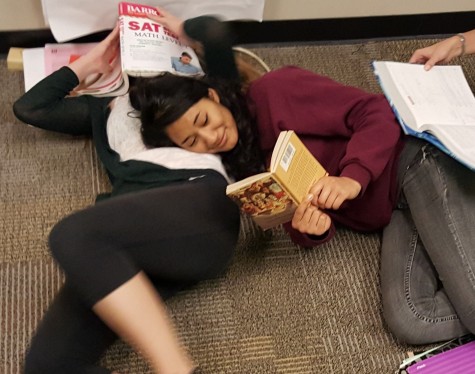Addressing Academic Anxiety

The editors get very anxious trying to juggle homework and extracurriculars during layout, a three-day period when we create the newspaper.
I was a sophomore when it happened. It seized me, throttled me, pushed me to the passenger seat of my own body. My heartbeat felt uncontrollable, and my gasps for air seemed futile. I had my first panic attack.
Anxiety is not a rare thing amongst students in 2016. The pressure to get into a good college, snatch lucrative scholarships, and end up with a decent job increasingly mounts itself onto backs of tired teenagers as they trudge through high school. The weight of the burden increases day after day and peaks at their junior year, which is notoriously the most difficult and stressful year of their trek to secondary education. They treat the last four years of public education as a jail sentence, imagining themselves breaking through the report card-lined walls and hobbling their way to freedom.
However, anxiety is an illness that continues to plague students long after high school, and most have no idea how to deal with this monster. Lillian Goldbard, LCSW (Licensed Clinical Social Worker) and Psychiatric social worker says, “one of the hallmarks of anxiety is that you feel like you worry a lot and you cannot control that worry.” Those with anxiety often feel like they are spiraling down as their fears consume them.
Anxiety varies from person to person, and can manifest itself in a multitude of ways. Wilcox senior Benicia Chiang shared how anxiety affects her life and its causes, which are due to, “a mild inferiority complex [she] developed while [she] was growing up.” Benicia disclosed, “I live in constant fear of accidentally doing things that might seem weird or different, and of seeming like I’m out of the loop. Sometimes my anxiety might lead to a introverted attitude and I avoid hanging out with people for a few days.”
When prompted about physical symptoms, Goldbart responded, “While there is shakiness, sweating, and etcetera, it isn’t really physical, it’s a mental problem. It’s a worry that won’t go away. When people are worried, they may lose their appetite or may not sleep as well, but to know what’s going on in a person’s mind from the outside, that isn’t so easy to see.”
In the case of long-term effects, stress releases a lot of hormones that damage every organ in one’s system, thus shortening one’s life span. It damages victims mentally by making them feel as though they cannot cope with whatever challenge crosses their path.
Goldbart gave advice on how to treat anxiety and stress, and the first thing to do is to lower one’s expectations. “You have to see who might be feeding into students’ expectations, as a lot of students have very unrealistic expectations. Anxious students feel that unless everything aligns the way it should be, their life will completely be ruined.”
This black-and-white mindset feeds into anxiety, by generating thoughts along the lines of “Unless these exact things were to happen now, the rest of my life will fall apart.” By reviewing one’s expectations, and analyzing the worst case scenario of a fear, the time-consuming worry can be treated and rationalized.
The primary way to treat anxiety is by leading a balanced life. Goldbart explained that “exercise is helpful because it releases hormones that calm you down. But it’s mostly doing things that you like to do. Try reviewing your schedule to see if there’s any fun in your life. Is there time for fun, connections, friendships, family, and your own interests?”
This is a foreign and confusing question to some students whose schedules are jam-packed with studying, homework, and extracurriculars. They often neglect friendships, which are crucial to alleviating stress. If you see your friends struggling with anxiety, simply being there for them can make all the difference.
Wilcox junior Brandon Tran prides himself on his ability to resist the beckonings of stress. “The thing that gets me through piles of work is by looking at it from an omniscient perspective, which is taking a step back and evaluating your current situation in the grand scheme of things.” In terms of the work itself, “The epitome of all high school advanced-procrastinators is that things don’t get done until the night before. I finish my long-term work two days before it’s due. Essentially, it rids work of its finality. Finality propels us to stress out and lose our hair to the ever-greying deities of risk and poor time management. And really, that’s what’s gotten me through Junior year thus far.”
Most importantly, families play a large role in helping their children deal with anxiety and stress. This includes lowering their expectations of their children, giving them time to have fun, not making fun activities contingent on grades, and not pressuring their children to take an excessive amount of AP classes if they cannot handle them.





